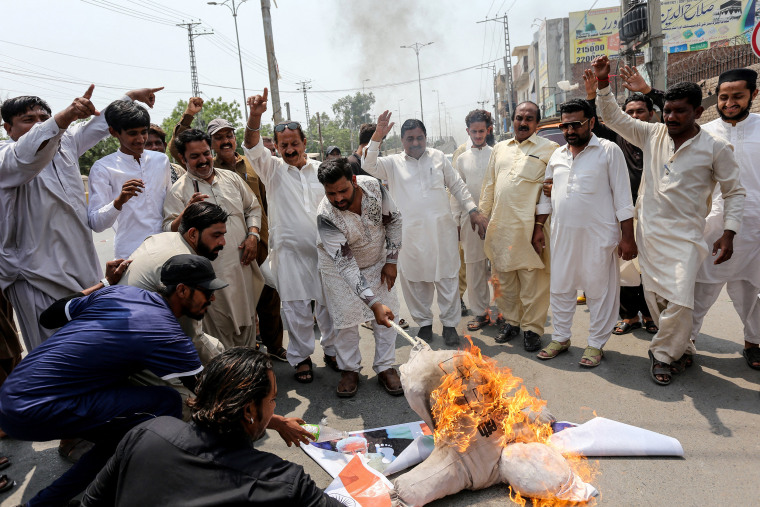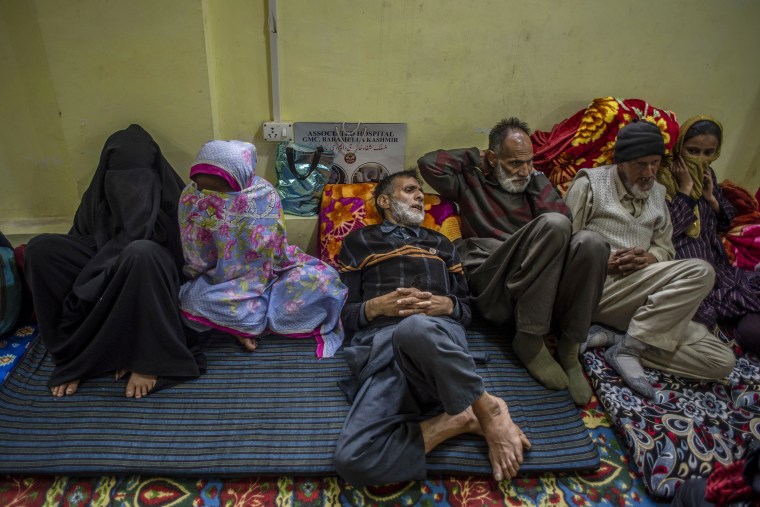With suspended cricket matches, power outages and air raid sirens, fears are swelling of an all-out war between India and Pakistan amid questions over how much of a mediating role the United States will be able to play.
The nuclear-armed neighbors engaged in their worst fighting in decades on Wednesday, when India launched an assault on Pakistan in response to a deadly terrorist attack for which New Delhi blames Islamabad.
Almost four dozen people were killed in the initial violence between the two countries, including India’s strikes on what it said were “terror camps” and the shelling in response by Pakistan, which denies involvement in the April 22 attack in the disputed Himalayan region of Kashmir.
Pakistan claimed partial victory, saying it downed five Indian fighter jets and dozens of drones, which India has not confirmed. India has said it does not wish to escalate but will respond firmly if Pakistan strikes its territory.

Both countries accused each other of continuing to launch new military attacks on Friday, including shelling of towns near their de facto border that Pakistan said killed five civilians. The Indian army also said it had “effectively repulsed” drone attacks by Pakistan, which denied the accusation.
Villagers have fled their homes amid cross-border violence near the de facto border in Kashmir, which both India and Pakistan claim in full and control in part.
Tensions have also escalated to cricket, a cherished sport in both countries. The Indian Premier League, which is among the richest sport leagues in the world, was suspended for one week on Friday amid safety concerns after a match was halted amid the turmoil.
Secretary of State Marco Rubio spoke with officials in both countries Thursday in the latest U.S. effort to ease tensions.
Speaking with Indian External Affairs Minister S. Jaishankar, Rubio reiterated his condolences over the April 22 terrorist attack in Indian-administered Kashmir, which killed 26 people, most of them Indian tourists. He also “reaffirmed the United States’ commitment to work with India in the fight against terrorism,” the State Department said.
In his call with Pakistani Prime Minister Shehbaz Sharif, Rubio “expressed sorrow for the reported loss of civilian lives in the current conflict,” the State Department said, and “reiterated his calls for Pakistan to take concrete steps to end any support for terrorist groups.”
Speaking with NBC News, an official Indian government source dismissed the idea of the U.S. or any other country playing a central mediating role, saying the issues were bilateral and that the message of any government to Pakistan should be to stop supporting terrorism. The source said that India’s strikes targeted terrorist infrastructure and followed 15 days of waiting for the Pakistani government to take its own action against militant groups.
An official Pakistani government source called India’s strikes “the ultimate act of provocation.” The source said that the actions taken by Pakistan so far have been in self-defense and that Pakistan reserves the right to respond to strikes on its soil.
Pakistan has called for a “neutral” international investigation into the Kashmir attack, and the government source said there was “no shred of evidence” that Islamabad had supported it.
President Donald Trump has not engaged directly with the leaders of India and Pakistan but said Wednesday that he wants “to see them work it out” and that “if I can do anything to help, I will be there.”
Lisa Curtis, an expert on South Asia at the Washington-based Center for a New American Security, said the Trump administration had sent mixed signals to the two countries and needs to “clean up” its public messaging.
Trump initially said the U.S. would not get involved in the crisis, and on Thursday Vice President JD Vance told Fox News, “We’re not going to get involved in the middle of a war that’s fundamentally none of our business.”
Rubio has made measured statements calling for reducing tensions, while Defense Secretary Pete Hegseth said India had a right to defend itself.

The U.S. has previously played a key role in defusing conflicts between India and Pakistan, said Curtis, who was senior director for South and Central Asia on the National Security Council from 2017 to 2021. But U.S. relations with Pakistan have deteriorated in recent years, calling into question Washington’s influence with Islamabad.
The U.S. has left the door open to supporting Pakistan’s call for further investigation into the terrorist attack.
“We want the perpetrators to be held accountable, and are supportive of any efforts to that end,” State Department spokesperson Tammy Bruce told reporters Thursday.
India responded to the attack by launching military strikes on “terror camps” in Pakistan early Wednesday, which according to Pakistan killed 31 people, including civilians. Pakistan immediately claimed partial victory saying it had downed five Indian fighter jets and dozens of drones, which India has not confirmed.
The April 22 attack was the worst of its kind on Indian civilians in two decades and capped years of separatist insurgency and the bitter resentment between the two neighbors over Kashmir, a former princely state and the only Muslim-majority part of India which ceded territory to India in 1947 when the British colonial rule ended.
Pakistan and India have since fought three out of their multiple wars over it, and India has long-accused Pakistan of supporting cross-border terrorism, which Islamabad denies. Both countries now lay claim to Kashmir in full but only partly control.

Leave a Reply